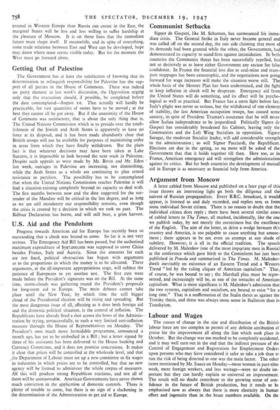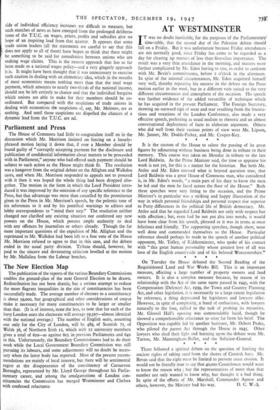Labour and Wages
The causes of change in the size and distribution of the British labour force are too complex to permit of any definite attribution of praise for the improvement all along the line which took place in October. But the change was too marked to be completely accidental, and it may well turn out in the end that the indirect pressure of the Control of Engagement and Registration for Employment Orders upon persons who may have considered it safer to take a job than to run the risk of being directed to one was the main factor. The other items mentioned by Mr. Isaacs on Monday—more women in part-tithe work, more foreign workers, and less wastage—were no doubt im- portant but they can hardly explain so universal an improvement. The result will no doubt contribute- to the growing sense of con- fidence in the future of British production, but it needs to be emphasised now as always that there is more elasticity in human effort and ingenuity than in the brute numbers available. On the
side of individual efficiency increases are difficult to measure, but such snatches of news as have emerged from the prolonged delibera• tions of the T.U.C. on wages, prices, profits and subsidies give no hope of an inspiring lead from that quarter. It appears that some trade union leaders (all the statements are careful to say that this does not apply to all of them) have begun to think that there might be something to be said for consultation between unions who are making wage claims. This is the nearest approgch that has so far been made to a national wages policy—and a very gingerly approach it is. It might have been thought that it was unnecessary to exercise such caution in dealing with an elementary idea, which in the mouths of most economists means nothing more than that the total wage payment, which amounts'to nearly two-thirds of the national income, should not be left entirely to chance and that the individual bargains which unions are able to make for their members should be co- ordinated. But compared with the suspicions of trade unions in dealing with economists the suspicions of, say, Mr. Molotov, are as nothing. And until those suspicions are dispelled the chances of a dynamic lead from the T.U.C. are nil.



































 Previous page
Previous page